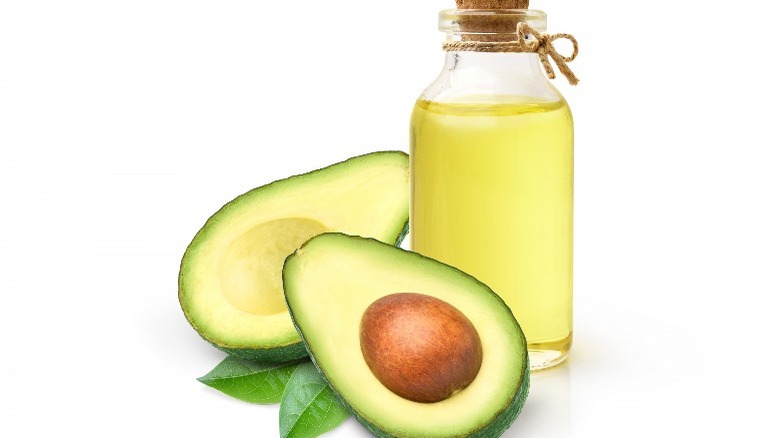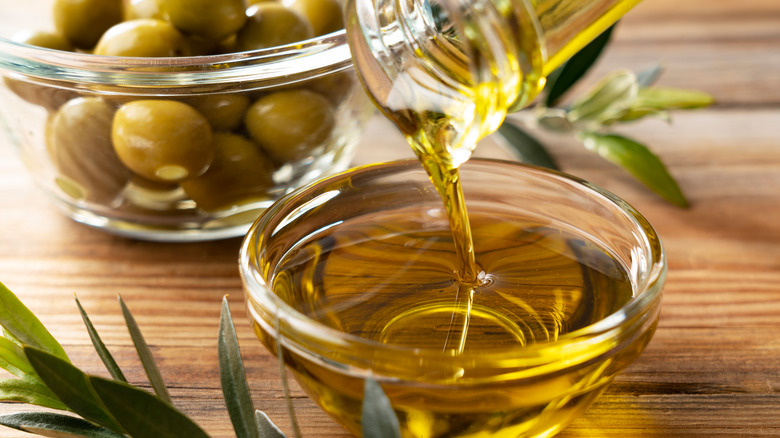The Nutritional Difference Between Avocado And Extra Virgin Olive Oil
There are many different oil options, from coconut, olive, and sunflower to avocado, soybean, and peanut. Each oil has its pros and cons, and some oils may not be suited for specific tasks or recipes because of their smoke points, which are just some of the tips for cooking with different types of oil. Two popular ones are avocado oil and extra virgin olive oil.
Per Centra Foods, olives are made into a paste, where the oil is then separated from the paste using a centrifuge. Some extra virgin olive oils are cold-pressed instead of spun, but the result is the same. Not all olive oils are extra virgin, though. The oil needs to be at, or less than 0.8 on the acidity scale and must not have any flaws in flavor or taste, among other requirements, to be labeled extra virgin olive oil.
According to California Avocados, avocado oil is made by pressing the pulp of pitted and skinned avocados. Then, oil and water are separated from the pulp using a centrifuge. Next, the oil is skimmed from the top of the water, resulting in the avocado oil we buy in grocery stores. Avocado oil and extra virgin olive oil are made using similar processes, but what's the nutritional difference between them? Let's break it down.
Avocado oil is great for skin and eye health
According to WebMD, one tablespoon of avocado oil has 124 calories and 14 grams of total fat, with 2 grams being saturated fat. Avocado oil has large amounts of oleic acid, which may reduce high blood pressure, and contains monounsaturated fat that may raise good HDL cholesterol and minimize bad LDL cholesterol, which has been known to increase the risk of heart and artery diseases and strokes. Avocado oil may also help with inflammation due to cardiovascular issues, and it has vitamin E and lutein, which are vital for skin and eye health.
When combined with soybean oil, "avocado/soybean unsaponifiables (ASU)" are created, which may alleviate stiffness, pain, and joint issues due to osteoarthritis per Healthline. While avocado oil is fine to eat cold, it can also withstand temperatures up to 520 F, making it a great kitchen staple that can be used for everything from salad dressings and hummus to marinades and sauteing vegetables. Avocado oil is also one of the best oils to use to season your wok.
Avocado oil is a high-fat food, so it should be eaten in moderation. People who are allergic to avocados should avoid consuming it, and anyone with an allergy to latex or birch has an increased likelihood of having an avocado allergy. Furthermore, anyone that takes Coumadin (known as Warfarin generically) to help with blood clots should not consume avocado oil as the oil may worsen blood clotting issues (via WebMD).
Extra virgin olive oil aids in heart health
Per WebMD, one tablespoon of extra virgin olive oil has 119 calories and the same amount of fat as avocado oil: 14 grams of total fat and 2 grams of saturated fat. Of all olive oil types, extra virgin has the highest level of polyphenols, which are antioxidant compounds that may help reduce inflammation and the risk of certain cancers and heart disease. Polyphenols in extra virgin olive oil may help support healthy joints and bones.
Extra virgin olive oil also contains oleocanthal and oleuropein, which are also antioxidant compounds that are beneficial for preventing the formation of bad LDL cholesterol (via Healthline). The presence of oleic acid and vitamins E and K in extra virgin olive oil help open up blood vessels to encourage blood flow and healthy blood pressure levels, aid in bone and heart health, prevent blood clots, and protect against heart disease and strokes.
Extra virgin olive oil can handle temperatures as hot as 405 F and can also be used cold, per Healthline. It's great for marinades, salad dressings, stir-frying, sauteing, and as a finishing oil. Like avocado oil, extra virgin olive oil is high in fat, so be sure to consume it in moderation. Additionally, anyone with an olive allergy should avoid all olive oils.


